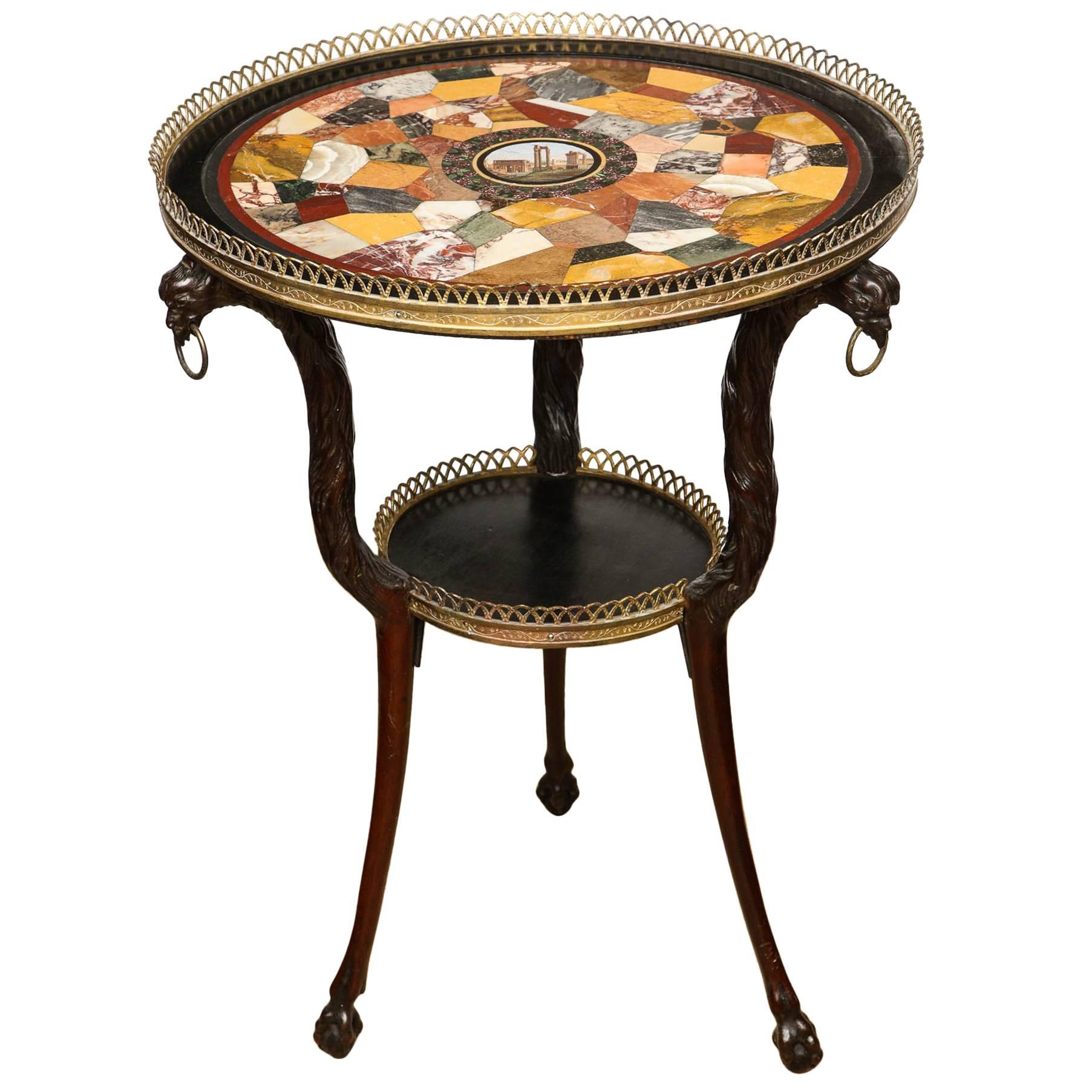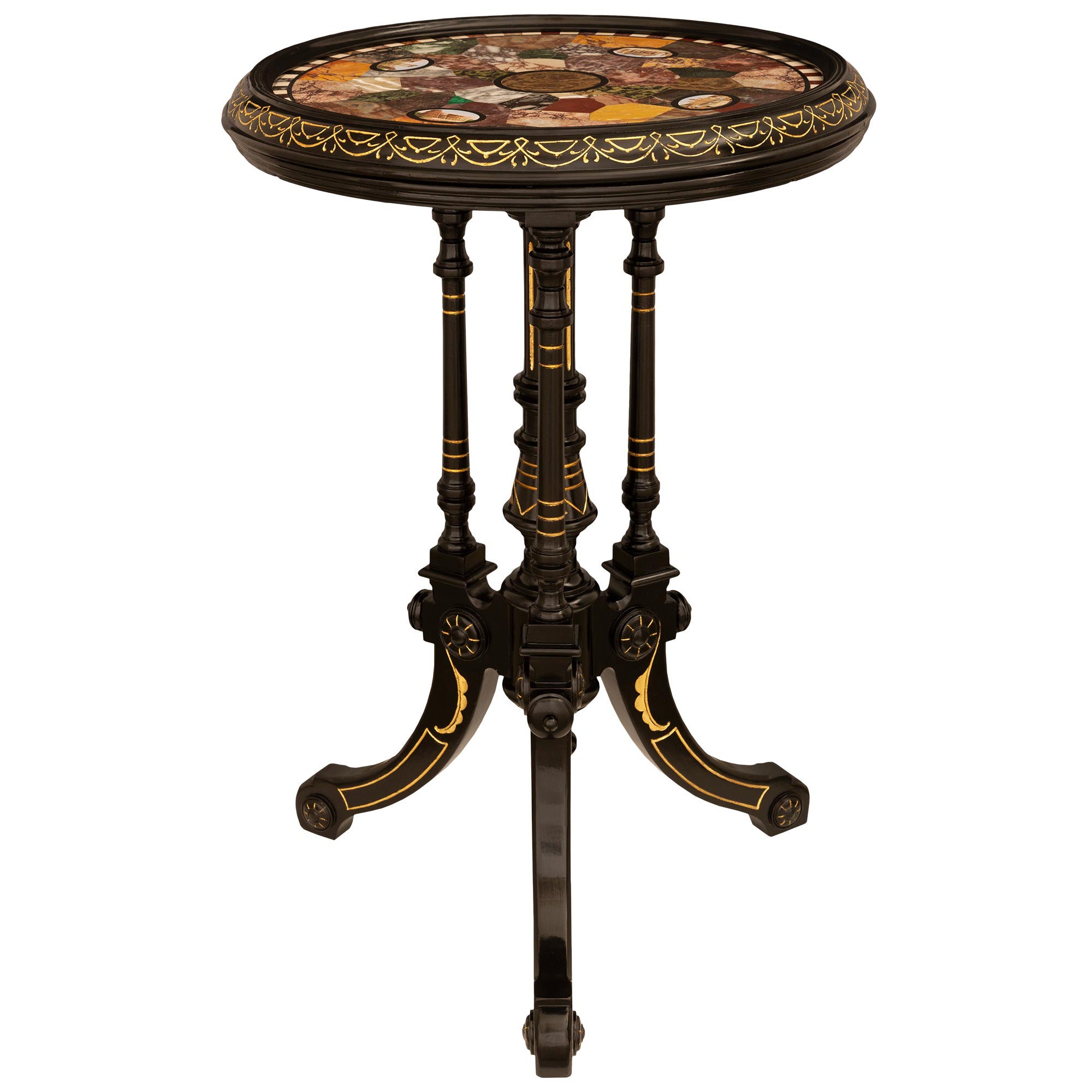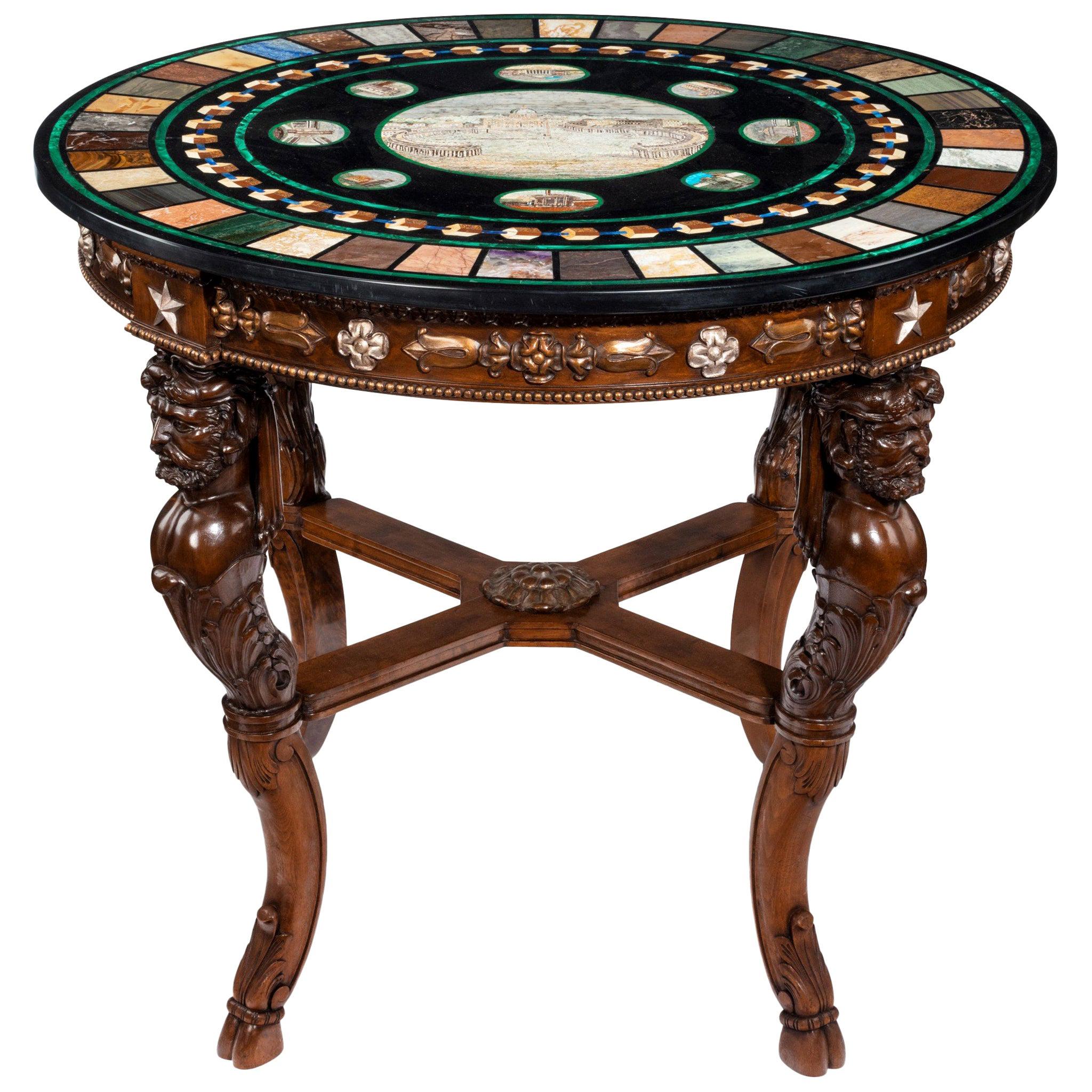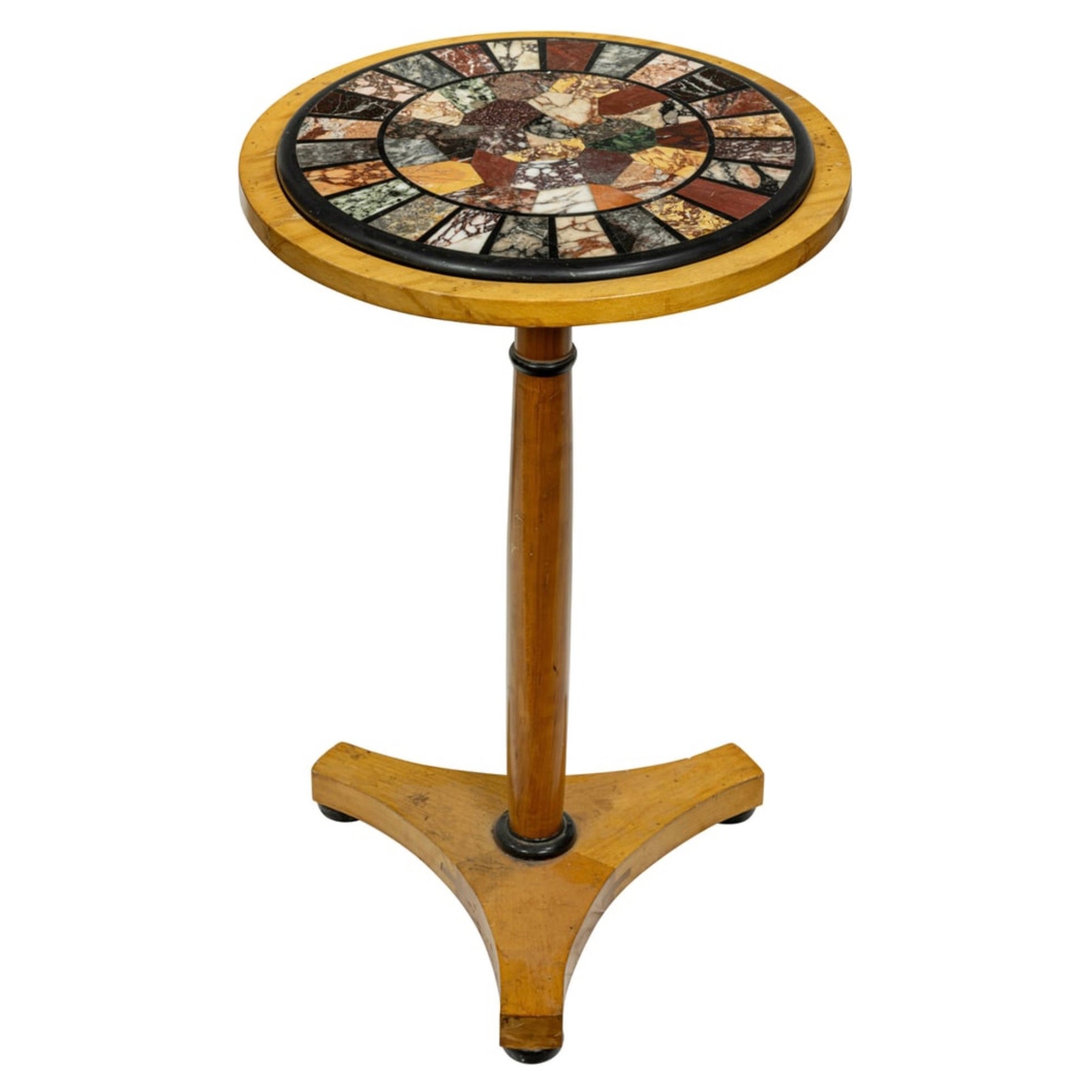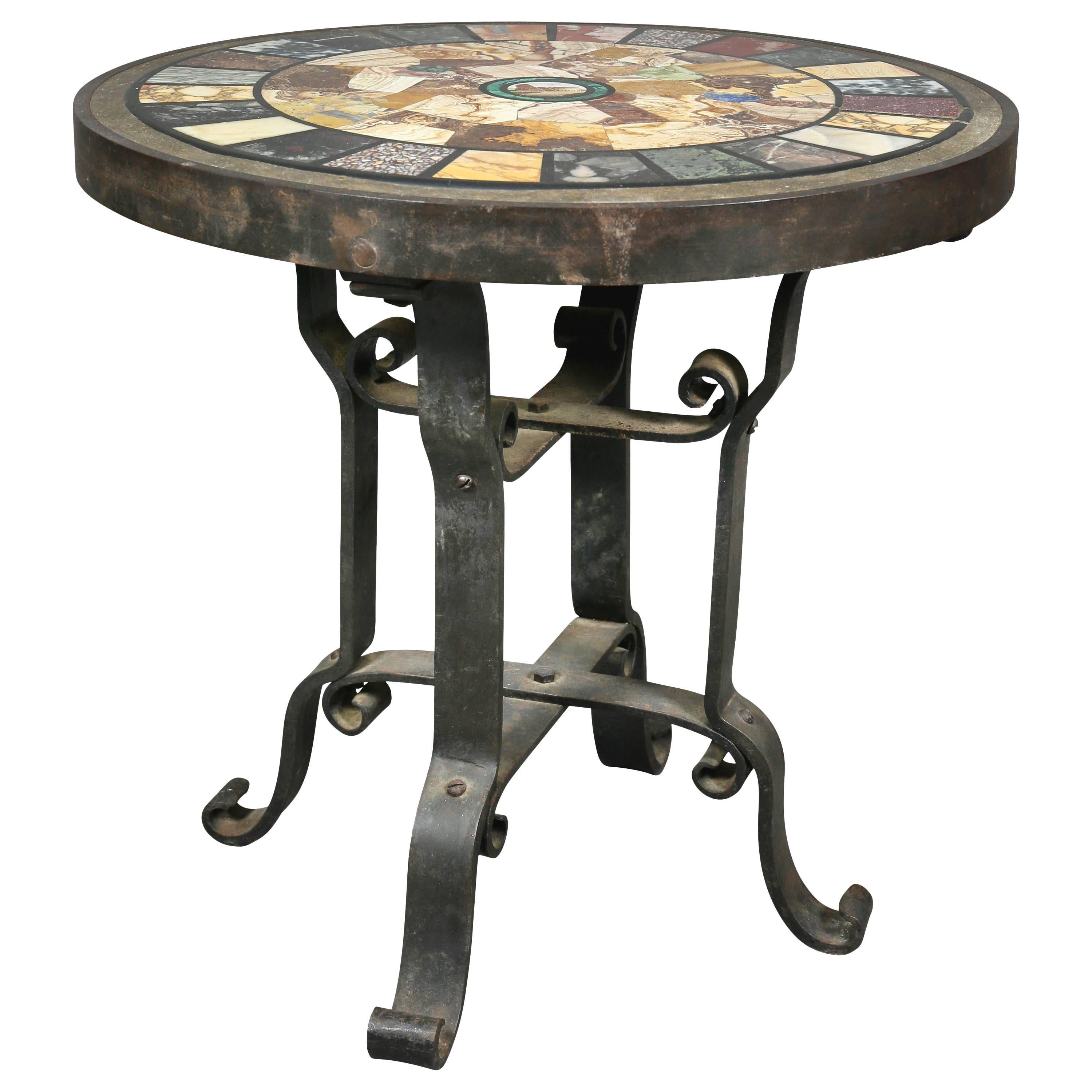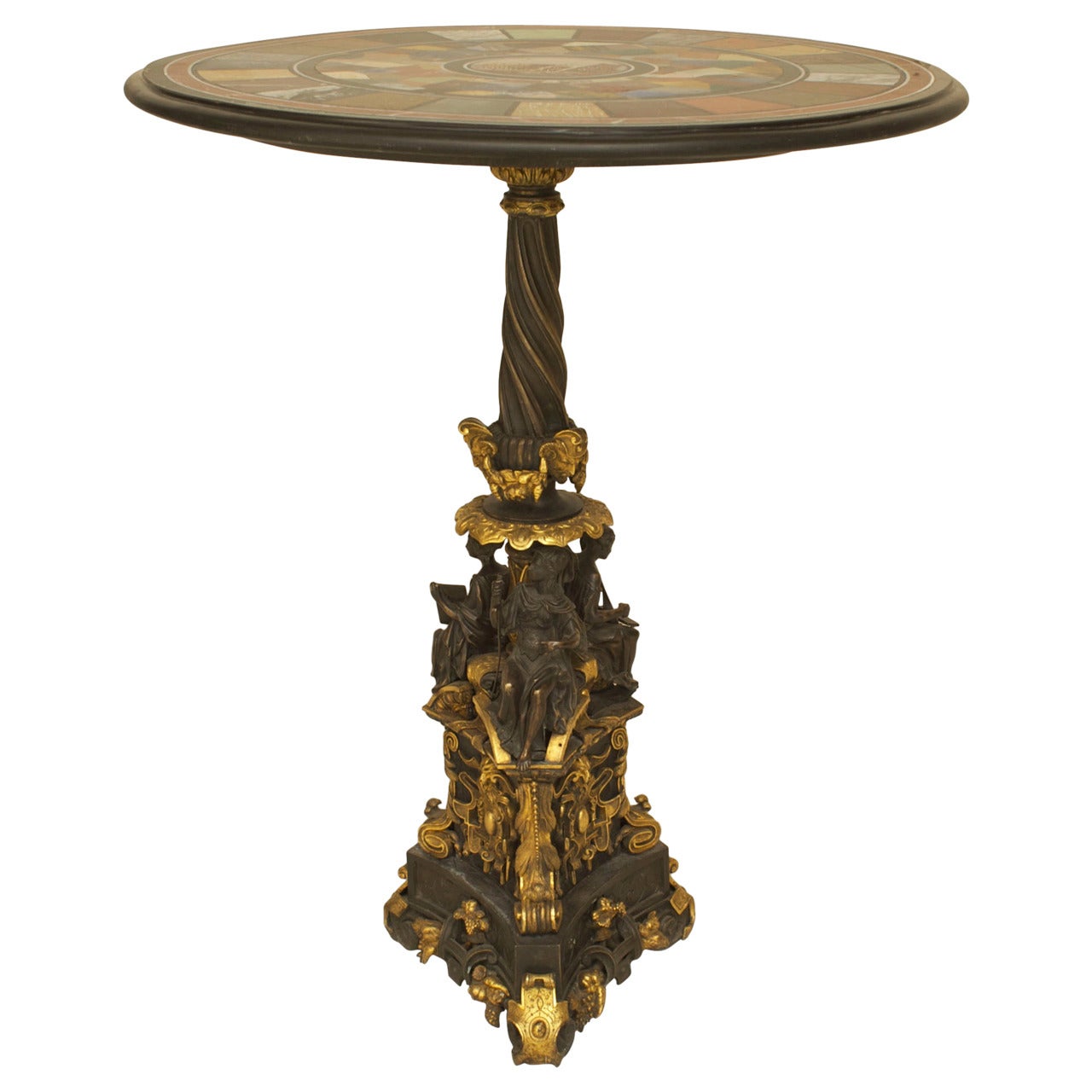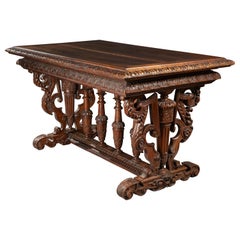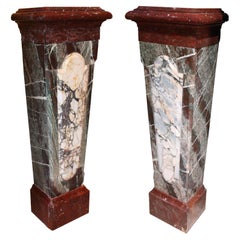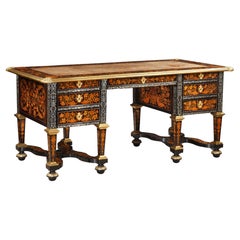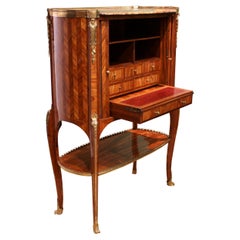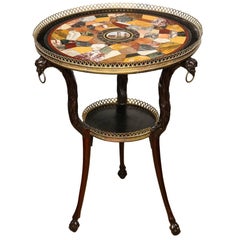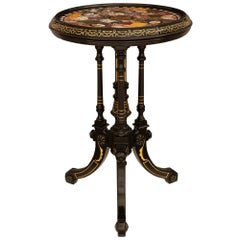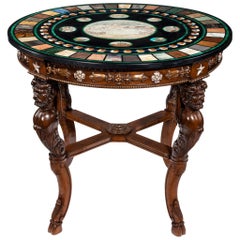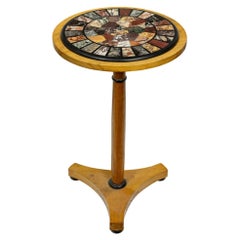Items Similar to Early 19th C. Roman Specimen Marble, Antique Glass and Micro Mosaic Gueridon
Want more images or videos?
Request additional images or videos from the seller
1 of 9
Early 19th C. Roman Specimen Marble, Antique Glass and Micro Mosaic Gueridon
$88,632.74
£65,681.74
€74,000
CA$121,000.54
A$134,608.14
CHF 70,563.28
MX$1,644,878.65
NOK 898,535.28
SEK 845,846.66
DKK 563,429.50
Shipping
Retrieving quote...The 1stDibs Promise:
Authenticity Guarantee,
Money-Back Guarantee,
24-Hour Cancellation
About the Item
Richly carved fruitwood gueridon supporting an important white marble top inset with various marbles, hard stones, with Roman polychrome antique glass and Roman micro-mosaic
Rome, Italy, first third of the 19th century
Probably by Francesco Sibilio
Total height: 77cm.
Top diameter 94.5 cm.
Important gueridon composed of:
- circular top in white Carrara marble inlaid with a band of “sea green” marble and 84 samples of hard stones, separated by shelves in black marble. In the center a Roman micro-mosaic representing a deer pursued by a dog, surrounded by tesserae in blue and yellow glass paste and two circles in Roman polychrome antique glass: reticelli, murrina, millefiori” dating from the Hellenistic period 1st century BC. J. C – 1st ap. JC
- carved wood base with gadrooned belt and corolla shaft supported by an octagonal molded base.
Among the samples:
Porphyry, agate, lapis lazuli, malachite, jasper, portor marble, grand antique, brocatelle, granite, alabaster…
Some samples come from quarries that have been exhausted since antiquity, such as cipolin, red porphyry from Egypt or green porphyry from Greece and are therefore from excavations.
Historical context
Our gueridon by its materials and its technique of realization is part of a series of furniture and objects produced in the first half of the 19th century in Rome under the effect of a craze for Antiquity and excavated objects. Trays of marquetry or marble samples became a specialty of Roman workshops, on the one hand thanks to the continuous arrival of ancient marbles from excavations and on the other hand thanks to wealthy and learned travelers visiting Rome in the part of the Grand Tour.
Several Roman craftsmen specialize in the manufacture of marble objects and more particularly table tops / pedestal tables inlaid with samples or marble marquetry, hard stones or micro-mosaics.
Among its artisans Francesco Sibilio specializes in the marquetry of antique glasses, the technique present on our set. He is also the first craftsman to combine antique glass tesserae with marble samples on his tops.
Francesco SIBILIO
Francesco Sibilio was not only interested in marbles but also in antiques in the broadest sense. It will be the first to combine micro-mosaics, marbles, semi-precious stones and antique glass tesserae as is the case for our spectacular tray. He collected pieces of antique glass and repolished them in order to exploit the richness of their colors. His talent allowed him to give glass an appearance or depth akin to that of agate. Most of these fragments can be dated from the 1st century B.C. to the 1st century A.D. Some come from glass plates or inlays, originally intended to imitate marble or semi-precious stones, such as porphyry or agates. Other fragments come from vases or glass dishes. These parts, which are generally convex, were heated and flattened under press before being reused.
A thorough examination reveals that the pieces of glass are held together with metal which has the particularity of reflecting light and giving an iridescent effect to the glass. Sibilio was able, better than anyone else, to take this technique to its peak. In addition, the thick white marble top is hollowed out to accommodate the different materials, which accentuates its depth.
Related works:
Only six tops are attributed with certainty to Francesco Sibilio, most of them are signed trays, we cannot mention four of them:
• top signed et dated 1824, d. 67,5 cm Casa d'Aste Babuino, Rome, Italy 9 April 2019
• top signed et dated 1824, d. 82 cm. Auction Christie's Paris 28 nov. 2017, lot 722.
• top signed et dated 1823, d. 64 cm. Auction Christie's London, 15 Dec. 1994, lot 244 & auction Christie's London, 30 sept. 1999, lot 128. Illustrated in Alvar-Gonzalez-Palacios «Lavori di Sibilio», «L'armadio delle meraviglie», Milan 1991, ill. 51.
• Top circa 1825, attributed to Francesco Sibilio, The collection of Mr Edric Van Vredenburgh, Auction Sotheby's London 6 June 2006, lot 98, d. 67,5 cm
The centre of our set is very close to the work of Francesco Sibilio, unfortunately in the absence of a signature given the few studies carried out on this subject and the lack of information prevents us from issuing an attribution with certainty. However, it is very likely that the talented and creative author of our set is Francesco Sibilio. This is evidenced by the mastery of the technique and the harmony achieved with marble samples and an ancient micro-mosaic in order to create a spectacular piece that perfectly reflects the know-how of Roman craftsmen through the centuries.
Comparative bibliography:
- González-Palacios, A., “Marmi, Pietre e Vetri: Lavori di Sibilio”, in Casa Vogue Antiques, March 1991, nr. 12, pp. 84-89.
- Newby, Martine S., “Francesco Sibilio and the reuse of Ancient Roman Glass in the Nineteenth Century”, in Annali 16 Congresso AIHV, London, 2003, p.401.
- Attributed to:Francesco Sibilio (Workshop/Studio)
- Dimensions:Height: 30.31 in (76.99 cm)Diameter: 37.2 in (94.49 cm)
- Style:Grand Tour (Of the Period)
- Materials and Techniques:
- Place of Origin:
- Period:
- Date of Manufacture:circa 1830
- Condition:Very good original condition, a few minor losses to the antique glass insets.
- Seller Location:PARIS, FR
- Reference Number:1stDibs: LU8168234434562
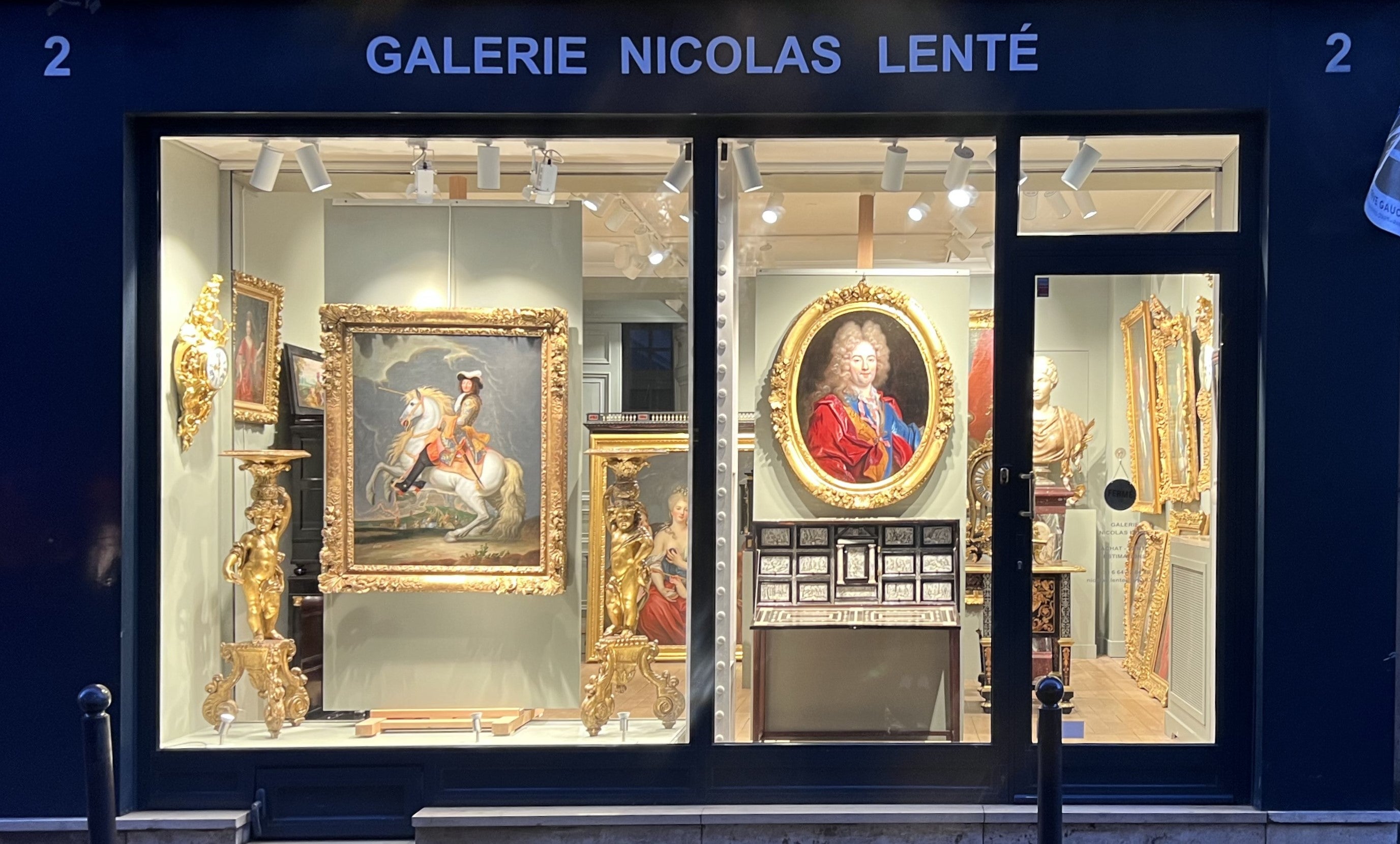
About the Seller
No Reviews Yet
Vetted Professional Seller
Every seller passes strict standards for authenticity and reliability
Established in 2011
1stDibs seller since 2023
- ShippingRetrieving quote...Shipping from: PARIS, France
- Return Policy
Authenticity Guarantee
In the unlikely event there’s an issue with an item’s authenticity, contact us within 1 year for a full refund. DetailsMoney-Back Guarantee
If your item is not as described, is damaged in transit, or does not arrive, contact us within 7 days for a full refund. Details24-Hour Cancellation
You have a 24-hour grace period in which to reconsider your purchase, with no questions asked.Vetted Professional Sellers
Our world-class sellers must adhere to strict standards for service and quality, maintaining the integrity of our listings.Price-Match Guarantee
If you find that a seller listed the same item for a lower price elsewhere, we’ll match it.Trusted Global Delivery
Our best-in-class carrier network provides specialized shipping options worldwide, including custom delivery.More From This Seller
View AllA late 16th century French Renaissance richly carved walnut center table
Located in PARIS, FR
A late 16th century Renaissance richly carved walnut center table
France, The Loire Valley area
Dimensions: h. 33.46 in., w. 59.45 in., d. 36.22 in.
Our remarquable table is a fabu...
Category
Antique 16th Century French Renaissance Center Tables
Materials
Walnut
$23,954 Sale Price
20% Off
A French Louis XIV style 19th century pair of carved marbles pedestals
Located in PARIS, FR
A French 19th century Louis XIV style pair of carved marbles pedestals.
The square moulded top and the base are in griotte red marble, the tapering body in Ribbon Campan marble with ...
Category
Antique Late 19th Century Italian Louis XIV Pedestals and Columns
Materials
Marble, Griotte Marble
A rare French Louis XIV large pewter and fruitwood inlaid marquetry desk
By Pierre Gole
Located in PARIS, FR
A rare French Louis XIV large pewter and fruitwood inlaid marquetry desk called “bureau Mazarin” attributed to Pierre Gole (1620 – 1684)
Dimensi...
Category
Antique Late 17th Century French Louis XIV Desks and Writing Tables
Materials
Bronze, Pewter
French 18th C. Louis XV/XVI Transitional Ormolu Mounted Secretaire by RVLC
By Roger Vandercruse dit Lacroix
Located in PARIS, FR
A Louis XV/XVI transitional ormolu mounted tulipwood secretaire by RVLC
Rare and elegant secretary of elliptical shape, veneered on all sides of rosewood with herringbone decoration...
Category
Antique 18th Century French Louis XV Secretaires
Materials
Bronze
$30,542 Sale Price
25% Off
French 18th Century Regence Ormolu-Mounted Commode by Etienne Doirat
By Etienne Doirat
Located in PARIS, FR
A Regence ormolu-mounted commode by Etienne Doirat (Paris, 1675-1732)
Rare and elegant commode curved on the front and on the sides, in amaranth veneer arranged in sheets in the frames. It opens with four drawers in three rows: two large and two short and asymmetrical .
Rich ornamentation of chiseled and gilt bronzes: the Rococo frontal cartouche, mounts with oak leaf windings, foliated handles and clogs, rosettes on the sides.
Flanders red marble top.
Size: h. 35.04 inch, w. 56.69 inch, d. 33.46 inch
By Etienne Doirat (1675-25 June 1732), Regency period, 18th century
Although not stamped, our commode belongs by its shape and its bronze ornamentations to an identified corpus of the production of Etienne Doirat, one of the most talented cabinetmakers under the Regency.
This group of chests of drawers listed in public and private collections, some of which stamped E. Doirat are characterized by the almost identical front cartouche.
On our chest of drawers, this cartouche is formed by two scalloped lambrequins joined by a clip they are extended by branches with acanthus foliage and flowers with beaded friezes. Inside are two keyholes, the first with a lion's mouth, the second formed by two stylized dolphins facing each other with lion's paws under a valance.
Chests of drawers by Etienne Doirat with the frontal cartouche:
Commode in identical "tombeau" shape:
- Commode stamped Doirat, Christie's London, July 10, 2008 lot n 43
- Unstamped chest of drawers, doc. Me Tajan, published in "French 18th century Furniture" by Kjelleberg
Commode of different shape, identical front cartouche:
- Chest of drawers with three drawers, stamped Doirat, Christie's London, November 27, 2018 lot n 509
- Sarcophagus chest of drawers, stamped Doirat, J. Paul Getty museum, Los Angeles
- Chest of drawers with two drawers, stamped Doirat, private collection, illustrated in J. - D. Augarde
- Chest of drawers with three drawers, stamped by Migeon, but attributed to Doirat from the former Eugène Kraemer collection, sale at Galerie Georges Petit (Paris), May 5-6, 1913, lot 141; former Ogden Mills collection, Paris, rue de Varenne...
Category
Antique Early 18th Century French Régence Commodes and Chests of Drawers
Materials
Marble, Bronze
$36,680 Sale Price
30% Off
Italian 19th century pair of very tall decorative marble obelisks
Located in PARIS, FR
Monumental pair of obelisks veneered with following marbles: pink marble of the Pyrenees, blue Turquin and yellow of Siena.
A very decorative pair of tall obelisks that would look g...
Category
Antique Late 19th Century Italian Neoclassical Pedestals and Columns
Materials
Marble, Siena Marble
You May Also Like
Austrian Neoclassical Gueridon with Micro Mosaic and Specimen Marble Top
Located in Greenwich, CT
Very Fine Austrian Neoclassical gueridon table with gilt brass pierced gallery, the specimen marble top with Roman micro-mosaic center depicting ruins, hav...
Category
Antique 1830s Austrian Biedermeier Gueridon
Materials
Marble
Italian 19th Century Renaissance St. Specimen Marble And Micro-Mosaic Side Table
Located in West Palm Beach, FL
A most decorative Italian 19th century Renaissance st. Ebonized Fruitwood, Specimen marble and Micro-Mosaic side table. The table is raised on a tripod base with three 'C' scrolled l...
Category
Antique 19th Century Italian Renaissance Side Tables
Materials
Marble
Italian Micro Mosaic and Specimen Marble-Top Centre Table
Located in Lymington, Hampshire
A Neoclassical pietra dura, micro mosaic and walnut centre table, the circular black marble top with a large central micro mosaic roundel depicting St Peter’s Square, Rome, surrounde...
Category
Antique 1880s Italian Center Tables
Materials
Marble
Empire Style Fruitwood Gueridon w/ Early Italian Pietra Dura Inlaid Specimen Top
Located in Palm Springs, CA
A fabulous Italian specimen Pierre Dura marble top likely late 18th early 19th century with a more contemporary custom made table to display it. The Italian specimen top is signed il...
Category
20th Century Italian Gueridon
Materials
Marble
Italian Micromosaic and Specimen Marble Occasional Table
Located in Essex, MA
Circular top now cemented in a wrought iron base with scrolled legs. Top with central view of the Coliseum and surrounded by various hardstones including porphyry.
Category
Antique 1860s Italian Grand Tour End Tables
Materials
Marble
Italian Neo-Classic 19th Century Grand Tour Round Marble Mosaic Table
Located in Queens, NY
Italian Neo-classic (Late 19th Century) round specimen marble and micro-mosaic centered top on a Renaissance Revival triangular shaped parcel gilt & patinated bronze base with figure...
Category
Antique Late 19th Century Italian Neoclassical Gueridon
Materials
Marble, Gold Leaf, Bronze
More Ways To Browse
Micro Mosaic Italian
Marble Mosaic Table
L C Dining Table
Specimen Wood Tables
Antique Octagon Dining Table
Italian Specimen Marble
Italian Mosaic Dining Table
Antique Micro Mosaic
Antique Dog Table
Greek Mosaic
Ancient Egyptian Table
Yellow Marble Dining Table
Deer Table
Nr Table
Pedestal Marble Red
Antique Plate Shelves
Antique Pedestal Work Table
Antique Egyptian Glass
